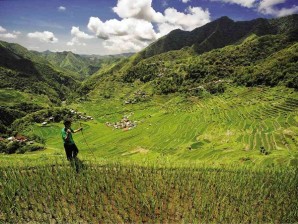Projects threatening terraces halted
BAGUIO CITY—The Department of Public Works and Highways (DPWH) has stopped road-widening projects in Ifugao province due to reports of damage to the rice terraces there.
Public Works Secretary Rogelio Singson ordered the DPWH Cordillera regional office to suspend roadwork in the Ifugao towns of Banaue, Kiangan and Hungduan in a July 18 memorandum, citing a complaint from the National Commission for Culture and the Arts (NCCA).
Adelina Suemith, NCCA executive director, alerted Singson in a July 1 letter about the damage to the terraces from road projects being undertaken there by the DPWH, based on the NCCA’s preliminary observations as well as its initial on-site dialogue with residents there.
The residents said their livelihood had been affected by the projects.
“The NCCA, by virtue of Republic Act No. 10066, otherwise known as the National Cultural Heritage Act of 2009, is tasked to protect the country’s World Heritage sites,” Suemith said in her letter.
Article continues after this advertisement“Kiangan, Banaue and Hungduan are three of the four towns containing the rice terraces of the Philippine Cordilleras, which are inscribed in the Unesco (United Nations Educational, Scientific and Cultural Organization) World Heritage list,” she said.
Article continues after this advertisementSuemith asked Singson for a remediation plan that would be coordinated with the NCCA heritage law enforcement unit.
The suspension order affected the national road improvement projects began in 2013 and which are being completed this year. Among these are the P539-million road connecting Banaue and Hungduan to Benguet province.
The complaint also led to the suspension of the P142.3-million project to complete the Ibulao-Julongan Road leading to the Julongan rice terraces in Kiangan.
The DPWH, however, said what the NCCA team might have seen were earth-dumping sites, offered by farmers, where soil and debris from the excavated road projects were kept.
Some farmers allowed the contractor to dump soil near their farms, intending to use the new soil to develop coffee plantations, said Edilberto Carabbacan, DPWH Cordillera regional director.
“The general picture we want to show the NCCA is that the dumping of excavated soil along the road was agreed upon by the DPWH contractors and the farmers there,” he said.
“Many farmers who agreed to these arrangements have been considering turning unproductive plantations into coffee farms because of the new market,” he said.
The DPWH’s last resort, he said, was to proceed with concreting single-lane roads through the three Ifugao towns if it would not be allowed to continue the widening project.
Carabbacan said these were provincial roads that were recently converted into national roads.
Ifugao Rep. Teodoro Baguilat Jr. on Monday said he received reports that the projects might have also damaged communal irrigation systems that might also require repairs.
“We fund roads to improve access to tourism areas and generally to improve trade and commerce in Ifugao,” Baguilat said.
But reports of damage to the terraces open up a discussion as to how best to introduce infrastructure projects in heritage sites. Vincent Cabreza, Inquirer Northern Luzon
